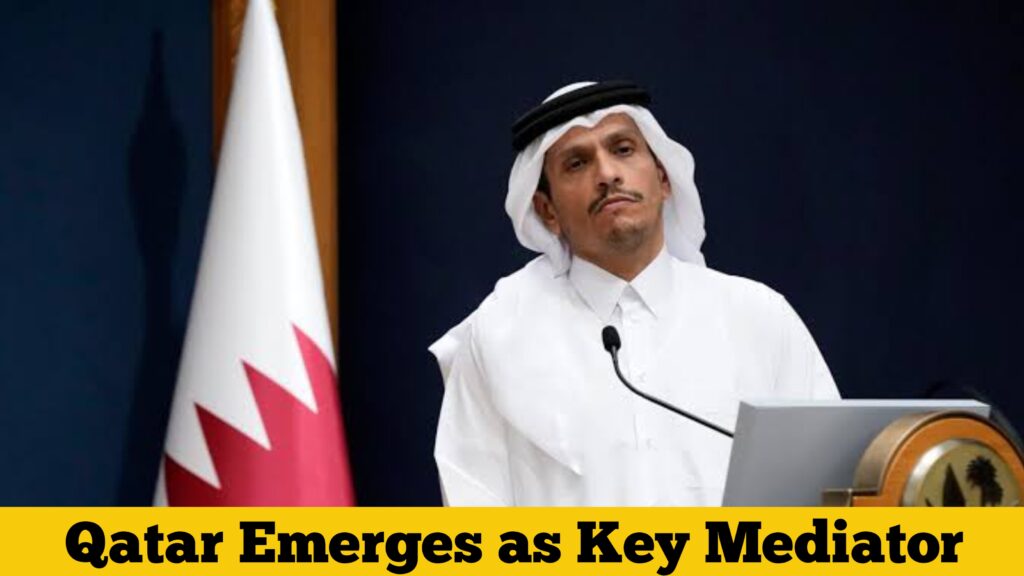
As tensions between Iran and Israel reached alarming heights, Qatar emerges as key mediator in an urgent bid to restore regional stability. In a rapidly evolving diplomatic effort, Qatar has taken center stage by hosting backchannel talks, leveraging its neutral stance and close ties with both Western allies and Middle Eastern powers. With the threat of full-scale war looming large, Qatar’s swift intervention is being credited with pulling West Asia back from the brink of catastrophe.
Table of Contents
Doha’s Diplomatic Push Brings Regional Players to the Table
In recent days, Qatar emerges as key mediator not just between Iran and Israel but also among neighboring Gulf nations that fear regional fallout. Doha reportedly engaged in shuttle diplomacy, speaking directly with officials from Tehran, Tel Aviv, Washington, and even Ankara to encourage de-escalation. According to insiders, Qatar offered to host a temporary conflict-resolution dialogue framework, signaling its intent to take a leading peacekeeping role in the region.
This bold diplomatic outreach has won praise from the United Nations and European Union, both of whom acknowledged Qatar’s balanced approach and ability to communicate effectively with all parties involved. By stepping up at a time when global powers are divided, Qatar emerges as key mediator trusted by both adversaries and allies.
Global Powers Welcome Qatar’s Role in Avoiding Wider Conflict
International responses suggest growing support for Qatar’s involvement. U.S. State Department officials noted that Qatar emerges as key mediator at a time when a neutral, reliable actor was urgently needed. Russia and China also welcomed the move, seeing Qatar’s position as a possible pressure valve that could prevent a broader war that threatens global oil markets and security.
Moreover, with Gulf oil infrastructure and shipping routes at high risk, Qatar’s ability to initiate immediate dialogue has helped ease market fears and calm diplomatic rhetoric on all sides. Analysts argue that without Qatar’s quick move, the conflict might have escalated far beyond missile exchanges.
Economic and Strategic Stakes for Qatar
Qatar’s mediation role is not just about diplomacy—it’s deeply tied to its strategic and economic interests. As a major LNG exporter and a hub for international diplomacy, regional stability is vital for Doha’s long-term ambitions. With its infrastructure and global reputation at stake, it is no surprise that Qatar emerges as key mediator in a crisis that threatens not just borders, but also energy supply routes and investment flows across the Gulf.
The Al Udeid Air Base, hosting U.S. forces, and the country’s strong links with both Iran and Western powers place it in a unique position. It has both the incentive and the influence to de-escalate tensions before they spiral into regional war.
Looking Ahead: Can Qatar Deliver Lasting Peace?
While immediate conflict may have been averted, the true test lies ahead. Can Qatar convert this temporary ceasefire into a sustainable peace framework? Much will depend on its ability to balance competing interests and ensure compliance from both Iran and Israel. Still, with this bold intervention, Qatar emerges as key mediator not only in the current crisis but potentially as a long-term force for peace in West Asia.
In the coming days, attention will shift to Doha’s next moves—whether it will host formal negotiations, involve multilateral bodies, or push for a longer-term truce. What’s clear is that Qatar’s role on the global stage has expanded, and the world is watching.
A Test of Qatar’s Rising Diplomatic Clout
This latest development marks a new chapter in Doha’s long-term diplomatic strategy. Over the past decade, the small Gulf nation has been positioning itself as a bridge-builder in global conflicts, from Afghanistan to Sudan. Now, as Qatar emerges as key mediator in one of the Middle East’s most volatile confrontations, it is testing its capacity to influence high-stakes geopolitics on a global scale.
Observers say the next 48–72 hours will be critical in determining whether the ceasefire sticks — and whether Qatar can sustain its momentum as a credible and effective peacemaker.
Do Follow for daily news.
